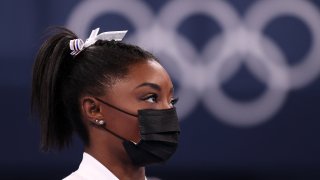
Simone Biles, who is considered the most accomplished gymnast of all time, withdrew from the team gymnastics competition at the 2020 Tokyo Olympics due to a mental health concern Tuesday.
"Whenever you get in a high stress situation you kind of freak out and don't really know how to handle all of those emotions, especially at the Olympic Games," Biles told reporters on Tuesday. "I have to focus on my mental health and not jeopardize my health and wellbeing."
In an Instagram post Monday, Biles described feeling "like I have the weight of the world on my shoulders at times," she wrote. "I know I brush it off and make it seem like pressure doesn't affect me but damn sometimes it's hard."
Get Philly local news, weather forecasts, sports and entertainment stories to your inbox. Sign up for NBC Philadelphia newsletters.
It's not clear if Biles will return to the individual events following this announcement. Biles said that USA Gymnastics Team, which won a silver medal, will be taking "a mental rest day" on Wednesday.
"It's okay sometimes to even sit out the big competitions to focus on yourself, because it shows how strong of a competitor and person that you really are, rather than just battle through it," Biles said.
But you don't have to be an elite athlete to encounter critical moments of on-demand stress, says Leah Lagos, a sport and performance psychologist in Manhattan.
Money Report
"It's normal for our bodies to be put in this fight-or-flight state when we're feeling judged or evaluated or needing to perform at our top level in front of other people," Lagos says.
So, how can you tell if you need to take a break to care for your mental health and what does that look like? Here's what you need to know.
Recognize symptoms
It's important to distinguish between an acute stress reaction of a highly competitive situation — think: "good" nerves, excitement and adrenaline that will resolve after the stressful event — versus symptoms of a mental health condition, Lagos says.
However, not sleeping, experiencing panic attacks and having trouble concentrating because you're so focused on negative thoughts could be signs of generalized anxiety disorder. While short-term nerves and anxiety might motivate you in the moment, mental health conditions require additional care and attention, Lagos says.
"I have to put my pride aside," Biles said Tuesday. "I have to do what's right for me and focus on my mental health and not jeopardize my health and well-being. That's why I decided to take a step back."
People respond to stress in very different ways, so it's important to understand your personal signs and symptoms that signal something is wrong. "I applaud [Biles] for knowing her body — she has to know her body at this point, given her level of talent, and she's saying, I know what I need to do at this moment," Lagos says.
"We have to protect our body and our mind," Biles told reporters Tuesday. "It just sucks when you're fighting with your own head."
Have a toolkit
Taking a mental health day might look different from person to person, but "knowing how to go into your cave to reset is part of the process," Lagos says. Some people need to take long weekends for rest and recovery, while others "integrate breaks into their daily architecture," she says.
Biles has said in the past that talk therapy is one tool that she utilizes to manage her mental health. Seeking out mental health assistance is "not something you should feel guilty or ashamed of," Biles told Glamour magazine in June.
Biles said Tuesday that "therapy has helped a lot as well as medicine," in terms of coping with her mental health concerns. (In 2018, the year that Biles spoke publicly about the abuse she suffered at the hands of disgraced USA Gymnastics doctor Larry Nassar, Biles said that she was taking anxiety medication to handle "ups and downs throughout the year.")
Know the strategies that tend to help you, so you can be prepared in the future. Things like meditation, breathing exercises, counseling or social media breaks have all been shown to improve relaxation and reduce stress.
"Prepare a toolkit for how you're going to manage stress on-demand in these critical moments," Lagos says. "Think about what do you want to do and what gets you back, not to a flow state, but just your baseline self."
Turn to your team
Having social support, whether that's through teammates or trusted friends, who can help you identify when you need a break and provide emotional support is also key, Lagos says.
Biles said that her teammates listened to her and took her decision to withdraw seriously, during a press conference Tuesday. "I had the correct people around me to do that," she said.
"Some of the best athletes in the world that I've worked with over the last decade and a half have an entire team," Lagos says. "It's the ability to lean into that team to help know how to navigate these moments that can be really helpful."
Many people, including former teammate and gold-medal Olympic gymnast Aly Raisman, applauded Biles for taking time to herself to recoup. "It's just so much pressure, and I've been watching how much pressure has been on [Biles] in the months leading up to the Games, and it's just devastating," Raisman told NBC's TODAY on Tuesday.
Sign up now: Get smarter about your money and career with our weekly newsletter






